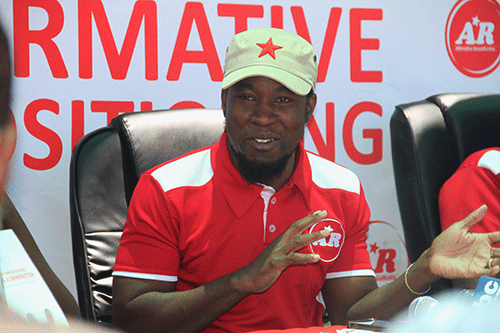Job Amupanda
On 13 July 2022, I sat in an auditorium in Lüderitz as a guest of the Lüderitz mayor, Anne Marie Hartzenberg, listening to Cabinet ministers Christine Hoebes, Tom Alweendo and Obeth Kandjoze on key government developmental projects.
They were joined by agriculture deputy minister Anna Shiweda and presidential economic advisor James Mnyupe, among other government officials.
The systemic corruption made many of us suspicious of government intentions.
Following the presentation of the economic advisor on the green hydrogen project, I stood to inform the audience not only about the basis of my skepticisms but also about the progressive ideas presented by the delegation.
We are advised by philosopher Edmund Burke that “facts are to the mind what food is to the body…The wisest [in the] commerce of human life is that man who has assimilated to his understanding the greatest number of facts”.
The delegation did well in clearly articulating the developmental intention and context of these projects.
This is so particularly the simplified manner in which the presentations were made.
Given that traditional leaders were in attendance, they could have had these presentations interpreted in local languages.
The ownership in the green hydrogen project got my attention, for which I sought clarification from the economic advisor.
He responded that negotiations are ongoing between the government and the successful bidder, Hyphen Hydrogen Energy.
One consideration is for the newly established sovereign wealth fund, the Welwitschia Fund, to take up the equity, calculated at 25% on behalf of the government.
It is clear that this is the best formula to keep the resources away from the mouths of the corrupt vultures. The importance of this fund, as a heritage for our children and future generation, cannot be overemphasised.
A simplified explanation is needed.
The Sovereign Wealth Fund principle
Concepts of conservation and sustainability are not alien to the African traditional community.
This community is understood to consist three beings: the dead, the living and the unborn.
The dead, the ancestors, are praised, spoken to and their teachings guide the living in their daily activities.
The lives of the living are intertwined with the dead.
The living can offend the dead, and the dead can punish living.
Unlike in western societies, the principles of conservation and sustainability have a spiritual dimension.
This community thinks and plans for the unborn – even before their parents meet.
An African grandfather would identify and reserve cows for his grandchildren – even before they are born.
After every harvest, the households in Owambo give a small portion of their harvest to the traditional leadership, called Oompale in Oshindonga, to be stored and used by the traditional leaders for those without and during any unfortunate eventualities that may threaten the livelihoods of the community.
The households understand the key importance is the principle of thinking about tomorrow – a principle that always underpinned the economic organisations of African traditional communities.
In a modern society, the tomorrow thought is dominant in individual lives and little in the community.
Think of several investment and insurance policies, such as life, disability and funeral covers.
When the Afrikaanse Verbond Begrafnis Ondernemings Beperk (AVBOB) was established in South Africa, following the 1918 Spanish Flu that killed about 300 000 South Africans within six weeks, its main purpose was to bury dying Afrikaners with dignity.
It started as a collective and not an individual intervention.
Today, more than 80% of AVBOB policy holders are black, and this company has buried all prominent South African leaders ever since, including Nelson Mandela. I argue that it is the African’s tomorrow thought that accounts for millions of dollars these companies make.
Indeed, without the tomorrow thought, it is doubtful if 32-days accounts, and unit trusts would be as profitable.
Alert for the Welwitschia Bill
The African modern state must learn from the African traditional society in thinking, planning and acting for tomorrow.
This is why a sovereign wealth fund is important in a modern context.
From the 16 to 17 June 2017, close to 1 000 activists of our movement gathered at the International University of Management for our ‘Generational Assembly on the National Youth Manifesto’.
Going into this gathering, our discussion document read: “There is a need for the country to save up for tomorrow. In all likelihood, we are to inherit a broke country. A Future Generations Fund is proposed to receive deposits from the national budget and receive 1% of the profits of all foreign companies”.
Five years later, our dream came true when President Hage Geingob launched the Welwitschia Fund on 12 May 2022.
There has been little interest in our mainstream public discourse on this fund.
It can either be because of the trust deficit in government or failure to aggressively engage society on the matter.
Analysed closely, the Welwitschia Fund may actually be one of the most revolutionary acts of our post-colonial regimes.
We ought to celebrate this as a country and a people.
It is planned for Parliament to pass the Welwitschia Fund Act.
In the meantime, it will be run by the Bank of Namibia.
We must carefully monitor the processes and study this bill when it comes.
We must share ideas on how it should work.
In this law, a Welwitschia levy can be introduced on all new business registrations and transactions.
We must also advocate for the law to make provisions for non-commodity voluntary contributions, where individuals can make contributions to the fund.
I will be one of the Namibians standing up to make monthly contributions to this national fund for the duration of my working life for the benefits of the current and future generations. Let us support the fund.


